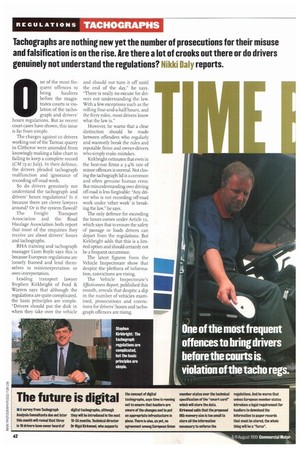Tachographs are nothing new yet the number of prosecutions for
Page 44

If you've noticed an error in this article please click here to report it so we can fix it.
their misuse and falsification is on the rise. Are there a lot of crooks out there or do drivers genuinely not understand the regulations? Nikki Dal!, reports.
One of the most frequent offences to
bring hauliers before the magistrates courts is violation of the tachograph and drivers' hours regulations. But as recent court cases have shown, this issue is far from simple.
The charges against ro drivers working out of the Tarmac quarry in Clitheroe were amended from knowingly making a false chart to failing to keep a complete record (CM 15-2i July). In their defence, the drivers pleaded tachograph malfunction and ignorance of recording off-road work.
So do drivers genuinely not understand the tachograph and drivers' hours regulations? Is it because there are clever lawyers around? Or is the system flawed?
The Freight Transport Association and the Road Haulage Association both report that most of the enquiries they receive are about drivers' hours and tachographs.
RHA training and tachograph manager Liam Boyle says this is because European regulations are loosely framed and lend themselves to misinterpretation or over-interpretation.
Leading transport lawyer Stephen Kirkbright of Ford & Warren says that although the regulations are quite complicated, the basic principles are simple. "Drivers should put the disk in when they take over the vehicle and should not turn it off until the end of the day," he says. "There is really no excuse for drivers not understanding the law. With a few exceptions such as the rolling four-and-a-half hours, and the ferry rules, most drivers know what the law is."
However, he warns that a dear distinction should be made between offenders who regularly and wantonly break the rules and reputable firms and owner-drivers who simply make mistakes.
Kirkbtight estimates that even in the best-run firms a 3-4% rate of minor offences is normal. Not dosing the tachograph lid is a common and often genuine human error. But misunderstanding over driving off-road is less forgivable: "Any driver who is not recording off-road work under 'other work' is breaking the law," he says.
The only defence for exceeding the hours comes under Artide 12, which says that to ensure the safety of passage or loads drivers can depart from the regulations. But Kirkbright adds that this is a limited option and should certainly not be a frequent occurrence.
The latest figures from the Vehicle Inspectorate show that despite the plethora of information, convictions are rising.
The Vehicle Inspectorate's Effectiveness Report, published this month, reveals that despite a dip in the number of vehicles examined, prosecutions and convictions for drivers' hours and tachograph offences are rising.








































































































